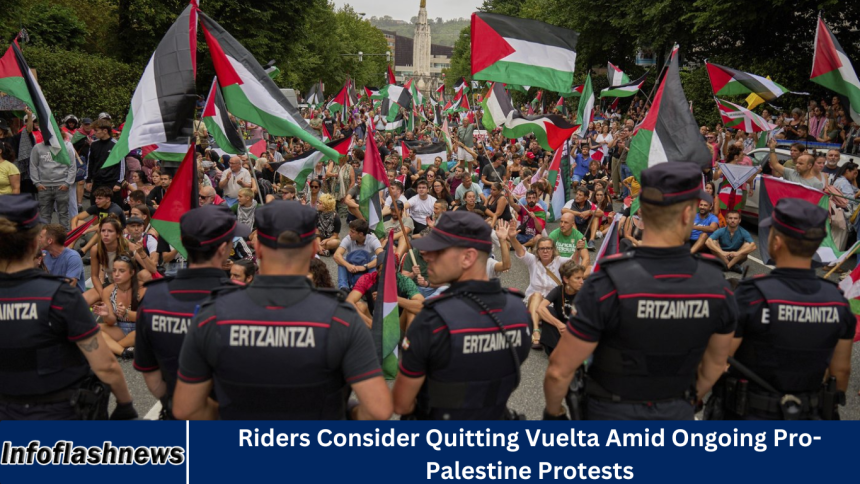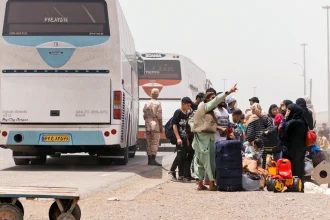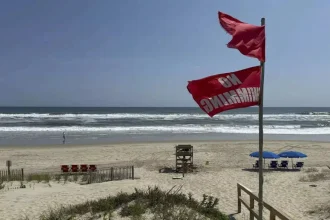The 2025 Vuelta a España, one of cycling’s most prestigious Grand Tours, has been thrust into the political spotlight as a series of pro-Palestine protests continue to disrupt the race. Tensions have escalated in recent stages, with multiple riders voicing concerns over safety, race fairness, and organizational response. Some professional cyclists are even considering withdrawing from the Vuelta if protests persist.
This development marks a growing intersection between sports and activism, raising questions about athlete safety, freedom of expression, and the responsibility of race organizers to ensure a smooth competition.
In this article, we’ll break down what’s happening at the 2025 Vuelta a España, what’s behind the protests, how riders are reacting, and what it could mean for the future of professional cycling and athlete activism.
More Read: California Girls’ Volleyball Team Forfeits Match Against Team With Transgender Player
What’s Happening at the 2025 Vuelta a España?
The Vuelta, held annually across Spain and occasionally neighboring countries, began on August 17th, 2025. From the outset, the race attracted global attention—not just for the competition, but for the political messages appearing along the route.
Pro-Palestine protesters have used the high-profile event to draw attention to the ongoing humanitarian crisis in Gaza, unfurling flags, interrupting stages, and staging sit-ins along the race course. Some even temporarily blocked roads during live broadcasts, prompting delays and confusion.
These disruptions have occurred in multiple stages, including:
-
Stage 5: Protesters formed a human chain across the road 10 km from the finish line.
-
Stage 8: A small group interrupted the time trial with banners reading “End the Occupation” and “Free Palestine.”
-
Stage 11: Riders had to stop momentarily due to protestors who spilled onto the course.
Rider Reactions: Safety, Fatigue, and Frustration
While many riders have expressed sympathy with humanitarian causes, several are reaching a breaking point due to the disruptions affecting their performance, mental focus, and overall safety.
Top Riders Speak Out
-
Jonas Vingegaard (Team Visma-Lease a Bike):
“We respect the right to protest, but not when it endangers riders and disrupts the race. We train for months for this event—it’s frustrating.” -
Remco Evenepoel (Soudal–Quick-Step):
“It’s a security issue now. We’re not saying they shouldn’t protest. But there has to be a better way.” -
Tadej Pogačar (UAE Team Emirates):
“If this continues, I might consider withdrawing. I’m here to race, not to navigate roadblocks and risk injury.”
The Threat to Quit: Real or Rhetorical?
Although no top rider has officially withdrawn due to the protests, the threat is gaining traction. Several team managers and cycling federations have reportedly held emergency meetings with race organizers, urging action to prevent further disruption.
Why Would Riders Quit?
-
Safety Concerns:
Unexpected road obstructions or crowd interference pose significant crash risks, especially at high speeds. -
Mental Distraction:
Top-level cyclists rely on intense focus. Repeated protests can derail strategies, increase anxiety, and unfairly affect results. -
Logistical Disruptions:
Teams plan nutrition, gear changes, and pacing based on strict timing. Protest-related delays interfere with these elements. -
Moral Stance:
Some riders argue that their presence may be used to politicize the event, prompting them to consider withdrawal on ethical grounds.
Race Organizers Respond: Promises of Increased Security
La Vuelta’s organizing body, Unipublic, has acknowledged the disruptions and pledged to increase security around the race route.
Official Statement:
“We respect the right to peaceful protest. However, the safety of athletes, staff, and spectators is our top priority. We are coordinating with local authorities to ensure the remainder of the Vuelta proceeds smoothly.”
Measures announced include:
-
Increased police presence at key points.
-
Road closures farther in advance of the peloton.
-
Enhanced crowd control near finish lines and mountain stages.
Despite these reassurances, skepticism remains among both riders and fans.
Public Reaction: Divided Opinions
The reaction from fans and the general public has been mixed. While many support the right to protest, others argue that athletes should not be caught in political crossfire.
Supporters of the Protest Say:
-
The Vuelta offers a massive platform to highlight humanitarian crises.
-
Disruptions are minor compared to the severity of the issue in Gaza.
-
Peaceful protest is a democratic right, even in sports.
Critics Say:
-
Sporting events should remain neutral ground.
-
Riders’ safety and career investments are being compromised.
-
Protests should not interfere with live, high-risk sporting events.
The Bigger Picture: Sports as a Platform for Protest
The Vuelta disruptions are part of a broader global trend where athletes, fans, and activists use major sporting events to amplify political or humanitarian causes.
Similar recent examples include:
-
Wimbledon 2023: Environmental activists interrupted play.
-
Tour de France 2024: Climate protestors briefly blocked the peloton in the Alps.
-
FIFA World Cup 2022: Human rights protests over Qatar’s treatment of workers and LGBTQ+ individuals.
Protesting during sports events is not new—but it is becoming more visible, sophisticated, and strategically planned.
Can Protests and Sports Coexist?
This Vuelta raises a complex question: Can major sporting events remain apolitical in an increasingly activist world?
Some experts argue that it’s unrealistic to expect political neutrality. Others say that while the message may be important, the method—disrupting high-speed races—is dangerous and unfair.
Possible Solutions Moving Forward:
-
Dedicated protest zones: Allow visible but safe protest areas near events.
-
Dialogue with protest groups: Proactive outreach may reduce risk of disruption.
-
Clear protest policies: Sporting bodies must define what types of protest are acceptable and where.
Implications for the Rest of the 2025 Vuelta
With nearly two weeks left in the race, the situation remains volatile. Race organizers must now balance:
-
Athlete safety
-
Freedom of expression
-
Public perception
-
Broadcast commitments
Rider withdrawals—especially by stars like Vingegaard or Pogačar—could damage the Vuelta’s global appeal and raise broader questions about race governance.
Potential Impact on Future Races
If riders do quit the Vuelta in protest of protests, it may set a precedent for how future races and organizations respond.
UCI (Union Cycliste Internationale) May Need To:
-
Implement global protest protocols.
-
Mandate security standards.
-
Consult with governments on protecting athletes and spectators.
Sponsors may also reconsider their involvement in races that become politically volatile.
Frequently Asked Question
Why are riders considering quitting the 2025 Vuelta a España?
What are the pro-Palestine protests at the Vuelta about?
Have any riders officially withdrawn from the race because of the protests?
How have race organizers responded to the protests at the Vuelta?
Are protests during cycling races common?
What are the safety concerns for riders during these protests?
Could these protests impact future cycling events?
Yes, if such disruptions continue, future cycling events may see increased security measures, revised protest guidelines, or even route changes to avoid politically sensitive areas. The UCI and race organizers might also adopt stricter protocols to balance protest rights with athlete safety.
Conclusion
The 2025 Vuelta a España has become more than a cycling race—it’s now a stage for geopolitical debate. With riders considering withdrawal amid ongoing pro-Palestine protests, the future of the race—and potentially professional cycling—may hinge on how organizers, authorities, and activists navigate the coming days. The world is watching, not just for athletic excellence, but for how sport can (or can’t) coexist with a world increasingly shaped by conflict, protest, and passionate calls for justice.














